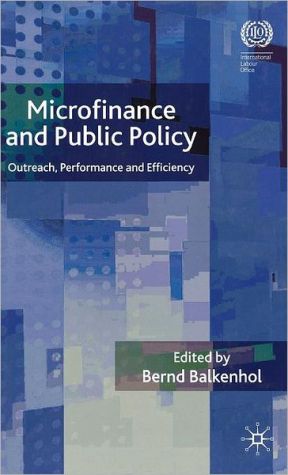Microfinance and Public Policy
Microfinance institutions (MFIs) provide a public good: they provide income-creating financial services to un-bankable people. If MFIs create and deepen markets where none existed before, there may be a case for public support. While subsidies are generally not favorably seen in financial sector development, being difficult to target and possibly distorting the local financial market, there may be situations where the net social benefits of micro-finance may exceed those of not doing...
Search in google:
This book argues that efficiency in both social and financial performance is a reliable criterion that can and should guide public policy support, regardless of orientation of a microfinance institution.
List of Tables xList of Figures and Boxes xiiList of Abbreviations xiiiAcknowledgements xvForeword xviiNotes on Contributors xixIntroductionEfficiency and Sustainability in Microfinance Bernd Balkenhol 3Promise and achievements 3Efficiency in the microfinance literature 9Efficiency: the concept 11Applicability of efficiency concepts in microfinance 14Efficiency versus financial sustainability 18Structure of the book 20Conceptual FrameworkPoverty versus Inequality Amadou Diop Isabelle Hillenkamp Jean-Michel Servet 27Introduction 27Defining and measuring poverty 29How microfinance can help reduce poverty 33Poverty reduction and financial performance 37Can microfinance reach the poor? 40The harmful side-effects: increased disparities 42Poverty Reduction through Microfinance: A Capability Perspective Flavio Comim 47Introduction 47Who are the poor? What are the issues? 48Positive mechanisms 51Negative mechanisms 54A capability perspective 56Achieving Poverty Outreach, Impact and Sustainability: Managing Trade-offs in Microfinance Anton Simanowitz 60Introduction: combining social and financial objectives 60Trade-offs 62Managing trade-offs 67Conclusions 69Smart Subsidies Jonathan Morduch 72Introduction 72Subsidies and microfinance 73Valuing subsidies 76'Crowding in' and 'crowding out' 78Conclusions 82Empirical AnalysisEfficiency in Microfinance Institutions: An Application of Data Envelopment Analysis to MFIs in Peru Yves Fluckiger Anatoli Vassiliev 89Introduction 89Previous research on MFIs' performance evaluation 90Performance analysis methodology 92Data sources and variable construction 96Efficiency analysis with the DEA model 99Conclusions 109Efficiency in Financial Intermediation: Theory and Empirical Measurement Thorsten Beck 111Introduction 111Interest spreads and credit rationing: theory 112Interest spreads and credit rationing: cross-country evidence 116Decomposing spreads 117Explaining spreads 120Conclusions and policy lessons 123Efficiency Drivers and Constraints: Empirical Findings Yousra Hamed 126Introduction 126Methodology 126The data 127MFI clusters 129Performance drivers and constraints 138Conclusions 149Measuring the Performance of MFIs: An Application of Factor Analysis Giovanni Ferro Luzzi Sylvain Weber 153Introduction 153The data 154Factor analysis: theory and practice 155Cluster analysis 161Assessing what determines performance 166Conclusions 169Selected Country StudiesContextual Factors Determining Poverty Outreach and Financial Performance: The Case of Mali Renata Serra Fabrizio Botti Milasoa Cherel-Robson 173Introduction 173Domestic contextual factors: institutions, state and markets 174External factors: the implications of subsidy withdrawal 177Conclusion 182Contextual Factors Determining Poverty Outreach and Financial Performance: The Case of Morocco Sadd Filali Meknassi 184Introduction 184Institutional context 186Support by banks 186Subsidies 187Conclusion 188Contextual Factors Determining Poverty Outreach and Financial Performance: The Case of Eastern Europe and Central Asia Justyna Pytkowska 191Introduction 191Access to resources 195Financial performance 195Social performance 197Auctioning Subsidies: Chile's 'Access to Credit Program' Vito Sciaraffia Merino 200Introduction 200Microenterprises in Chile 201Has the PAC achieved its goals? 202Conclusions 207ConclusionsPolicy Implications Bernd Balkenhol 211Global donor support to microfinance 213Weight of subsidies in microfinance 215What prompts public policy support to MFIs? 216General effects of public policy on efficiency in microfinance at the sectoral level 217Support measures affecting the efficiency of individual MFIs 221The way forward: how to support the best of class and the others 227The GIAN Survey 230Multivariate analysis and classification: social and financial performance 232Multivariate analysis and classification: efficiency, social and financial performance 240Bibliography 247Index 258








